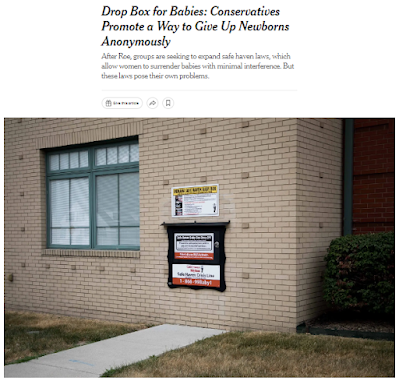Vứt con vào thùng rác: Sao phải thế?
để con vào các hộp ở bệnh viện hay trạm cứu hỏa nhé (hoàn toàn ẩn danh, ko phải nói với ai, ko ai thấy), ở đó có nhân viên được đào tạo để nhận/chăm sóc bé,
-----
No one had ever used it, though, until early April. When its alarm went off, Victor Andres, a firefighter (lính cứu hỏa), opened the box and found, to his disbelief (sự hoài nghi), a newborn boy wrapped in towels (khăn, tã).
The discovery made the local TV news, which praised the courage of the mother, calling it “a time for celebration.” Later that month, Mr. Andres pulled another newborn, a girl, from the box. In May, a third baby appeared. By summer, three more infants were left at baby box locations throughout the state.
The baby boxes are part of the safe haven movement (phong trào), which has long been closely tied to anti-abortion (chống phá thai) activism. Safe havens offer desperate (tuyệt vọng) mothers a way to surrender (từ bỏ, dâng, nộp) their newborns (bé mới sinh) anonymously (ẩn danh) for adoption (nhận làm con nuôi, nghĩa dưỡng), and, advocates (người ủng hộ) say, avoid hurting, abandoning (từ bỏ) or even killing (giết) them. The havens can be boxes, which allow parents to avoid speaking to anyone (tránh phải nói với bất kỳ ai) or even being seen (hoặc bị nhìn thấy) when surrendering their babies. More traditionally, the havens are locations such as hospitals (bệnh viện) and fire stations, where staff members are trained (được đào tạo) to accept a face-to-face handoff from a parent in crisis (khủng hoảng).
All 50 states have safe haven laws meant to protect surrendering mothers from criminal charges (tội hình sự). The first, known as the “Baby Moses” law, was passed in Texas in 1999, after a number of women abandoned infants in trash cans or dumpsters (thùng rác). But what began as a way to prevent the most extreme cases of child abuse has become a broader phenomenon, supported especially among the religious right, which heavily promotes adoption as an alternative to abortion.
...The adoptions themselves could also be problematic (có vấn đề), with women potentially unaware (không biết) that they are terminating parental rights (từ bỏ quyền cha mẹ), and children left with little information about their origins (nguồn gốc).
Bài trước: Liệu "đu đỉnh" được bao lâu?
Tags: idea



Post a Comment